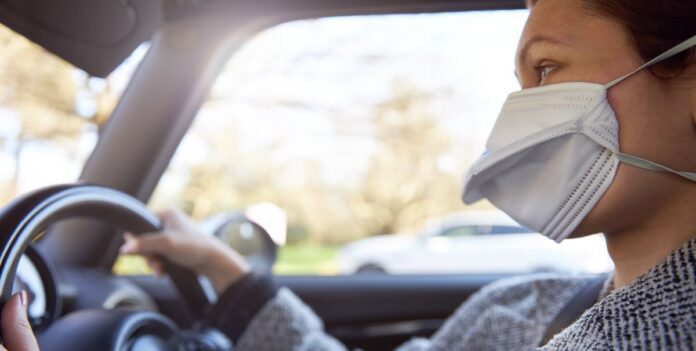4.6 million drivers have had an accident or near-miss since the pandemic started, with almost a quarter admitting they’re out of practice driving1
More than a quarter of motorists (27%) have gone longer than a month without driving since the pandemic started
Vehicle use is halved, as motorists admit using car almost five days a week pre-pandemic, but claim to drive only three days a week now
The number of people making weekly long-distance journeys has fallen by almost two-fifths (38%) since the pandemic started
More than one in eight drivers (13%) feel less confident on the road and are more worried about having an accident now compared to 12 months ago
Psychologist Dr Dorn outlines symptoms of driving anxiety, as more people suffer post-COVID
Confused.com releases tips for overcoming driving anxiety and how to respond if you’re put in a tricky situation
The pandemic sparked a decline in driving, making for quieter roads. And now, as the clocks go back and darker nights and mornings are drawing in, it’s another challenge motorists must face. No wonder, one in ten UK drivers now admit to feeling anxious when getting behind the wheel.
That’s according to new research by Confused.com, which found that more than 4.6 million(1) (12%) have had a car accident or a near miss while driving since the pandemic began, which could explain why many drivers are experiencing anxiety at the thought of getting behind the wheel again. In fact, almost a quarter of those (24%) who have had an accident or near-miss said it was because they felt out of practice driving, while almost a third (29%) said it was due to them feeling flustered behind the wheel.
While it comes as no surprise that driving levels reduced due to the pandemic, more than a quarter of motorists (26%) admit they hadn’t been behind the wheel for longer than a month since the first lockdown began.
In fact, vehicle use has almost halved since the COVID pandemic began. Pre-lockdown, drivers used to get behind the wheel almost five days a week on average. But the research shows this average has dropped to only three days a week now. It’s not rocket science that less time spent on the road will mean drivers will become more out of practice.
Similarly, the number of people making long-distance journeys on a weekly basis has fallen by almost two-fifths (38%) since the pandemic started. That explains why more than one in eight drivers (13%) are less confident behind the wheel and more worried about having a road accident now, compared to 12 months ago.
But that’s not to say that there aren’t some positives to come from driving less. A fifth of motorists (20%) have said they’re more likely to walk short distances rather than drive since the lockdown. Yet, as the world starts to re-open, there will likely be times when it’s necessary to get back in the driving seat, which could trigger anxiety and worry, especially for the one in twenty drivers (6%) who have said they’re confused about how to overcome driving anxiety.
Expert psychologist, Dr Dorn, explains that “anxiety in the general population could be more than 3 times higher during the COVID-19 outbreak” meaning that it can “appear progressively as people begin to return to work and social activities”.
For those unfamiliar with the symptoms, Dr Dorn says that “typical bodily reactions during experiences of driving anxiety include heart palpitations, increased sweating and feeling short of breath as the anxiety state takes hold, either behind the wheel or just when thinking about driving”.
To try and ease any concern, Confused.com has created a guide offering Dr Dorn’s tips on how to overcome driving anxiety before, during and after getting behind the wheel and how to deal with any tricky situations.
The last 12 months have been an ordeal for all of us, and when coupled with the disruption to normal routines, it’s expected that even the most confident drivers would have some nerves at the thought of driving on busier roads again.
Almost a third of motorists (30%) say they feel nervous when driving to unfamiliar places, while a quarter (25%) are put off by other drivers speeding. Meanwhile, tailgating tops the list for causing driving nerves, with almost a third of motorists (32%) citing this as the reason for their anxiety. To make things worse, one in five drivers (20%) say they’d be confused about what to do regarding exchanging details with another road user, contacting their insurer, or making a claim if they were to be involved in a road accident now.
The thought of returning to ‘normality’ can be daunting, as almost a third of motorists (32%) say they never want to see traffic return to pre-lockdown levels. In fact, one in eight drivers (12%) say they feel less confident driving than before the pandemic started, while one in ten (10%) said they feel anxious or nervous.
For many people, driving was part of daily life, but it’s easy to fall out of routines, which has been proved as one in ten motorists (10%) fear their driving skills have got rusty over the last year. In fact, one in six people (16%) have noticed that their elderly relatives are driving less or have stopped driving altogether since the pandemic began.
Safety when driving is paramount, which is why motorists need to be in the right frame of mind when behind the wheel.
But one in fifteen drivers (7%) are confused about the safest way to calm nerves while driving. The most popular remedies include listening to music while in the car (39%), having someone else take charge on giving directions (17%) and driving with a passenger in the vehicle (13%).
While lots of people have welcomed spending less time in the car, it’s important that motorists feel comfortable and confident when the time comes for them to get back behind the wheel.
Alex Kindred, car insurance expert at Confused.com, comments: “While reduced commutes and quieter roads have been a welcome change for many, it’s important that we feel safe, secure and confident when the time comes to jump back behind the wheel.
“It’s easy for us to feel out of practice when our driving routine changes, but it’s a concern when that turns into a feeling of dread. To help ease this feeling, our guide gives some tips on how to overcome any driving anxiety, and how to respond if you’re put in a tricky situation.”
Help keep news FREE for our readers
Supporting your local community newspaper/online news outlet is crucial now more than ever. If you believe in independent journalism, then consider making a valuable contribution by making a one-time or monthly donation. We operate in rural areas where providing unbiased news can be challenging. Read More About Supporting The West Wales Chronicle

























